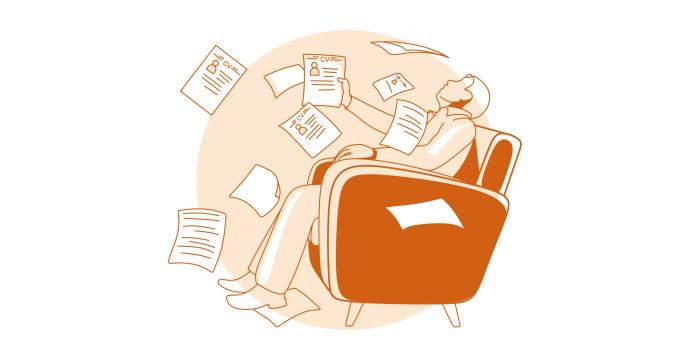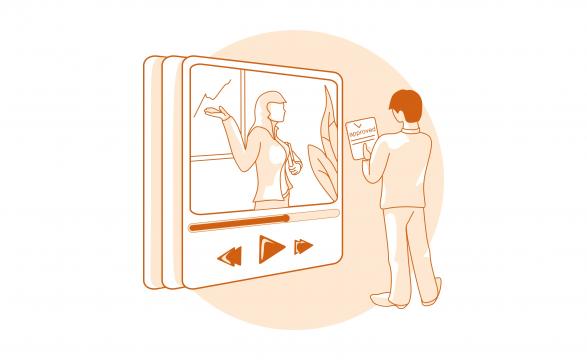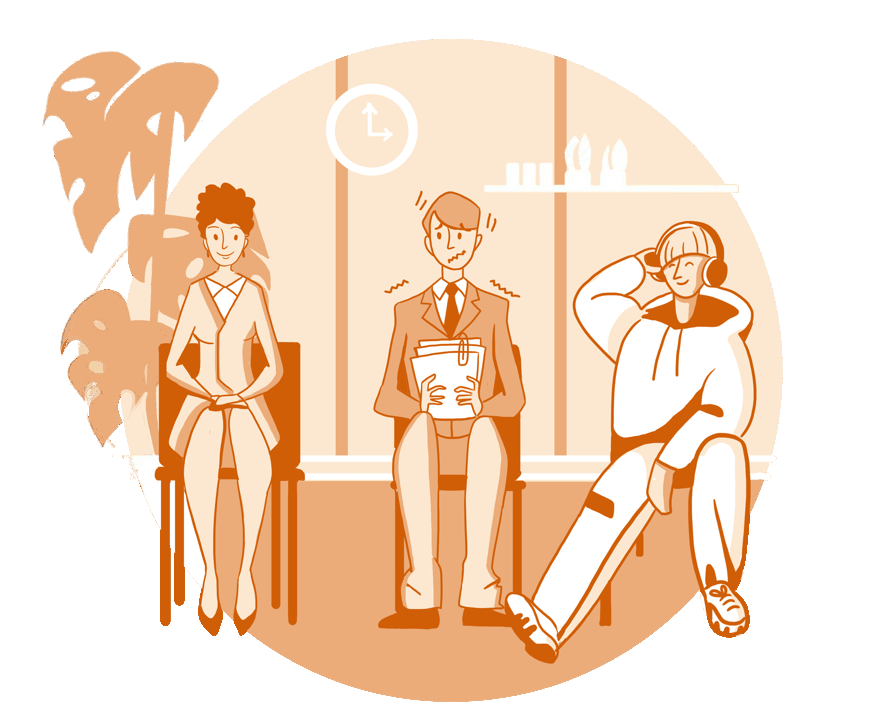
In the twenty-first century, we are all used to paying attention to
people's non-verbal behavior. Their posture, where they look, whether they
keep eye contact, how they gesture - all of this can form a specific
impression of a person's character.
Hiring managers often consider this, but can we always trust our impressions of candidates' body language during interviews? We all tend to recognize a person's nature through non-verbal cues, but they can often be misleading. You never know how a person behaves in stressful situations, especially in job interviews.
It's a good thing that body language is not a science that needs mastering. All you need to do is understand the basic body language cues during interviews, which will help you form a better impression of the job seeker.
What is Body Language in a Job Interview?
Body language in a job interview refers to your nonverbal communication signals and gestures during the interview process. You can tell a lot about your confidence, personality, and level of interest in the job from these nonverbal cues.
Nonetheless, interpreting another person's body language can be challenging. You never know what's in a person's head. Generally, we can assume that job candidates who blink often are overly anxious. But can we be sure that this is the problem? It may not be a signal of nervousness but a problem with your eyesight or lenses. Keeping an open mind and avoiding questionable conclusions is critical.
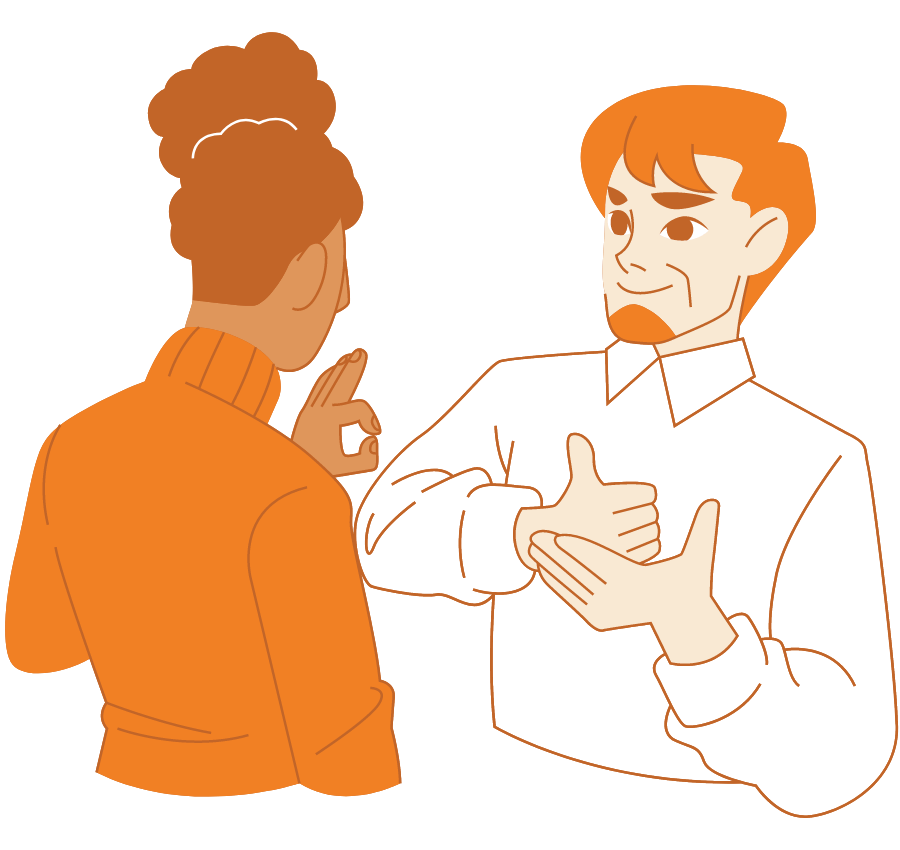
However, you must still know some common body language cues during a job interview to understand candidates' motives.
Body Posture
Good posture will inevitably help an applicant make a great impression at an interview. Therefore, pay attention to how the applicant is sitting. For example, if the candidates slouch and lean backward, it may indicate a lack of self-confidence or disrespect for the interviewer.
Conversely, if they lean forward in their seat, this, as a rule, represents positive body language. In addition, it may indicate interest and engagement in the conversation. For example, the person may be motivated by the possibility of getting a job and excited about working for your company.
Body Movements
Head movements, such as nodding, can indicate agreement and interest in what the interviewer is saying. It usually means the candidate is actively listening and interested in the conversation.
Shoulder movements help people express their emotions. For example, if candidates describe their experience vividly but remain as still as a board or move only one shoulder, they may be insecure or lying.
It's important to remember that body movements should be considered with verbal responses and qualifications when assessing a candidate's suitability for a job. Body movements can provide valuable insights, but they are just one part of the larger picture.
Eye Contact
It is said that the eyes are the mirror of the soul. It's not a coincidence that you can understand a lot from the looks. Eye contact is considered a manifestation of trust and an indicator of honesty. It's hard to tell if a person is being honest with you if they constantly look away or focuses on some random object.
However, it can be challenging to assess a person's "eyes." Continuous eye contact may indicate rudeness or staring. Shy or non-social people find it difficult to maintain eye contact, so they may be afraid to look directly into the eyes.
It is also natural to look away when someone wants to remember or think about something.
Furthermore, there is a theory that looking directly into the eyes is more common when someone lies.
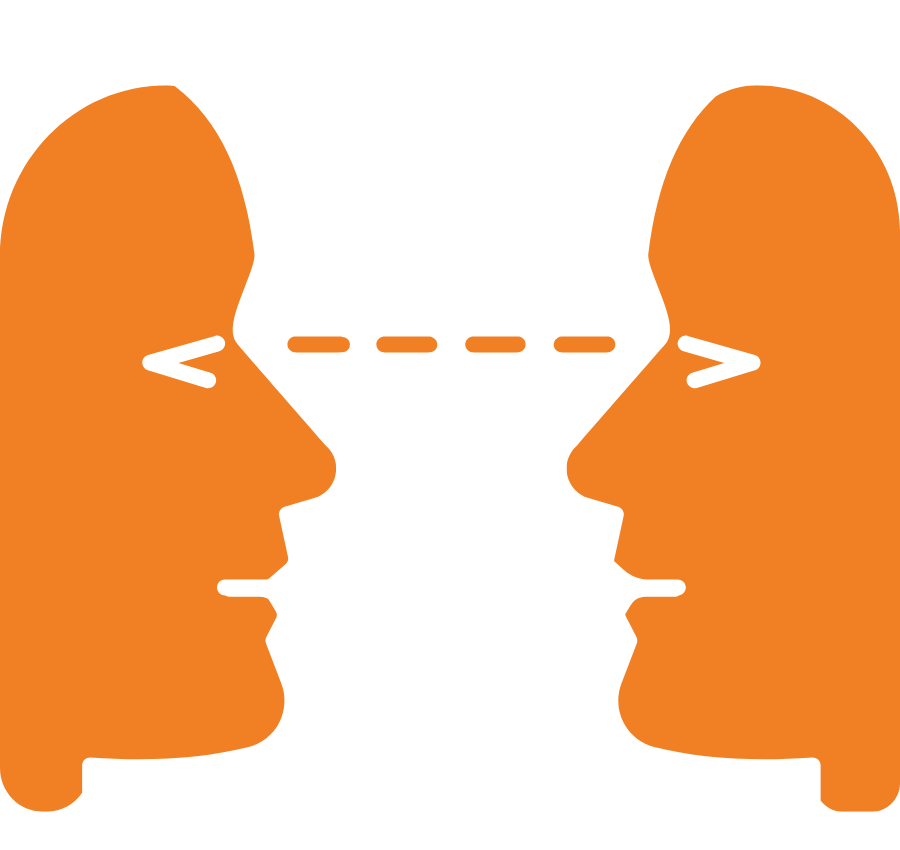
Hand Gestures
Hand gestures are a significant element to add emotion to our story. In this way, candidates can emphasize something and express themselves. However, there is a limit to everything - if innocent expressiveness turns into hyper-drama, you should be wary of it unless you hire an actor🙂.
Job seekers who actively use sudden movements or point fingers are most likely authoritative, so if you're looking for a team player, pay attention to this.
When a candidate plays with their hair or constantly touches their face, it may indicate deception or discomfort.
Also, we used to believe that a candidate's crossed arms indicated uncertainty and a defensive attitude. Most people do not like it when people cross their arms in front of us, as that hand position distances them.
However, it is standard during the first job interview, and if the candidate opens up and unfolds their arms during a conversation, it is a good sign.
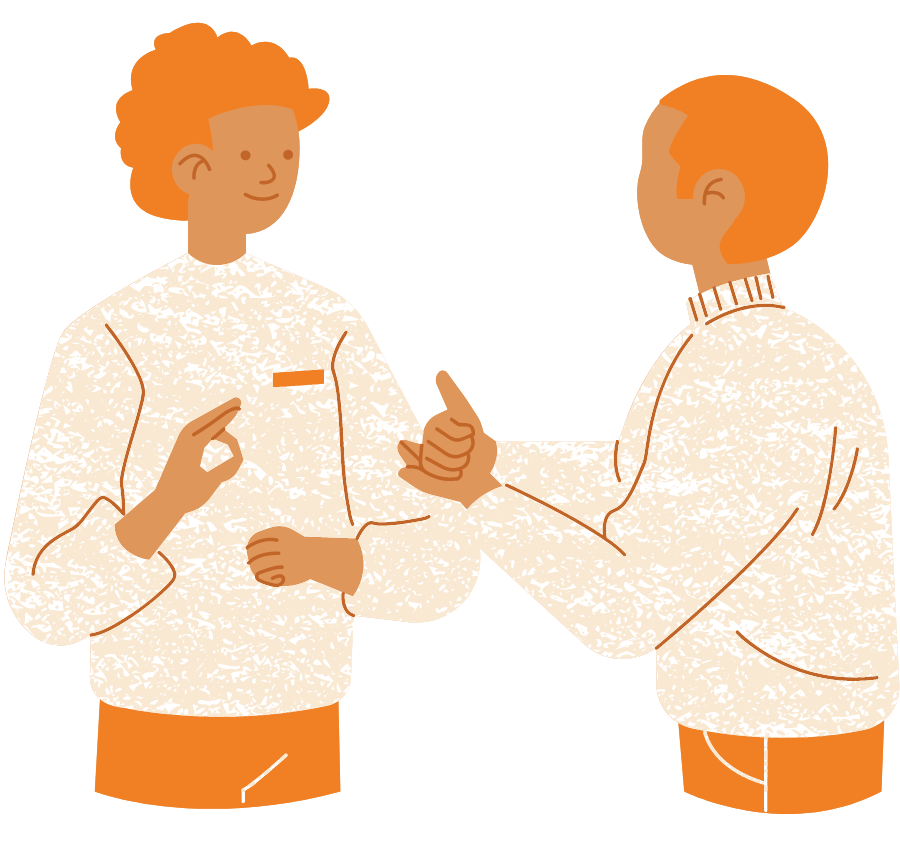
Facial Expressions
Facial expressions are the most transparent and most understandable indicator of a candidate's feelings. It is not so difficult to recognize a fake facial expression and forced smile because when asking questions in real time, the candidate does not have much time to fake it.
A genuine smile is one of a candidate's most joyous expressions. In addition, it can indicate that a candidate is enthusiastic and optimistic about the job opportunity and demonstrate confidence and comfort in an interview setting. The opposite of this is a frown, which indicates discomfort, disagreement, or confusion.
The position of the eyebrows also says something. Raised eyebrows reflect interest and enthusiasm. Conversely, furrowed eyebrows can indicate confusion, anxiety, or discomfort.
Squinting may indicate a skeptical candidate not being convinced by what the hiring manager says. And the cherry on top is a neutral facial expression. It is difficult to interpret and usually indicates either concentration and seriousness or stress and anxiety.
How to Read Body Language as an Interviewer?
When preparing for a job interview, hiring managers often ignore the importance of understanding body language in an interview. That's a waste because simply realizing that body language can be used to obtain and interpret important information can give you a significant advantage and some answers immediately.
Considering all of the above and comprehension of the basic principles of behavior and body language, you may wonder: How will this help me choose the right candidate?
Here are a few tips that'll help you organize all your knowledge into one folder:
-
Analyze behavior.
If a candidate behaves too reserved and does not emit harmless vibrations, it does not mean they won't be a good fit for your company. Be careful if a person constantly checks their phone, as this behavior may indicate disinterest. -
Notice changes.
You can also learn something by watching how the candidate changes in movement or posture. For example, you notice that the candidate has started tapping their foot. Does this mean the interview is too long, or do they face uncomfortable question? -
Сonnect the dots.
You may not always know the correct interpretation of a candidate's behavior. However, look at the whole picture. You are most likely on the right track to understanding if you notice multiple signs of disinterest, aggression, or fakeness simultaneously. -
Ask away.
The easiest thing a hiring manager can do when they feel they are being left out of the loop is to ask clarifying questions. Do you think the candidate is disinterested? Ask him. Do you think the candidate feels nervous? Ask him.
Body Language Tips for Job Seekers
As a candidate, it is crucial to understand how the interviewer sees you. Understanding own body language is already a huge part of the way to a successful interview. Effective body language lets job seekers convey confidence, enthusiasm, and professionalism.
Also, one of the most important things is to create a good impression on the interviewer. So here are some body language tips for job seekers :
- Maintain eye contact: Maintaining positive eye contact throughout the interview can make you look confident and interested in the job opportunity. Avoid looking away or down, as this can indicate nervousness or disinterest.
- Sit up straight: Sitting straight and leaning forward can convey confidence and engagement in the conversation. Avoid slouching or crossing your arms, which can signal discomfort or defensiveness.
- Hand gestures: A great way to convey enthusiasm and engagement in a conversation. Be careful not to make too many gestures or make them too large since this can be distracting or overwhelming.
- Smile: A friendly smile conveys positivity and enthusiasm. Avoid excessive or inappropriate smiling, as this may appear insincere.
-
Mirror the interviewer's body language:
Mirroring the hiring manager's body language can convey a sense of
rapport and engagement. For example, if the interviewer leans
forward, you might lean forward slightly.
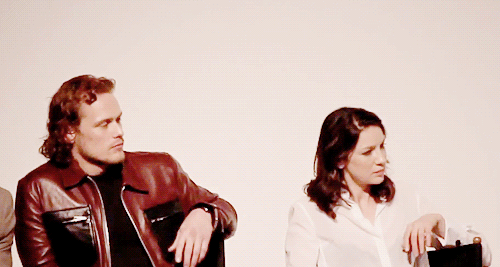
-
Be aware of your breathing:
Being aware of your breathing can help you remain calm and relaxed
during the interview. Whenever you feel nervous or anxious, take a
few deep breaths.
- Body language and posture practice: Practicing good posture and body language in everyday life can help you feel more confident and comfortable during a job interview. Pay attention to the importance of body language in social situations and develop healthy habits.
How to Launch Your Next Hiring Campaign Successfully?

Recruitment is critical for any organization, and selecting suitable candidates can significantly impact the company's success. With the increasing use of video interviews and virtual recruitment methods, assessing a candidate's body language has become more critical.
Here are some benefits of recruitment for interviewers and how the tips above can help them assess candidates in the videos that job seekers create with Playhunt .
- Better candidate selection🪬: By paying attention to a candidate's body language, interviewers can get a better understanding of their thoughts, emotions, and intentions. This information can be used to assess a candidate's suitability for the job and make more informed hiring decisions.
- Improved communication🥸: Understanding a candidate's body language can help interviewers communicate more effectively with them during the interview. Interviewers can establish rapport by mirroring the candidate's body language and observing their nonverbal cues. It will help the candidate feel more comfortable and at ease.
- Increased objectivity🤔: Body language can provide objective data about a candidate's thoughts and emotions, which can help reduce bias during the hiring process. By relying on nonverbal cues and verbal responses, interviewers can make more objective assessments of a candidate's suitability for the job.
- Enhanced candidate experience👀: By paying attention to a candidate's body language and using effective communication techniques, interviewers can create a more positive candidate experience. That can build a positive employer brand and attract top talent to the organization.
- Cost-effective recruitment💰: Video interviews and virtual recruitment methods can be cost-effective in assessing candidates, particularly for remote positions or candidates who cannot travel for in-person interviews.
The tips mentioned above for reading body language during a job interview can be beneficial for assessing candidates in the videos they create with Playhunt .
By paying attention to a candidate's eye contact, facial expressions, posture, hand gestures, and tone of voice, interviewers can gain valuable insights into their suitability for the job.
Additionally, mirroring the candidate's body language and using effective communication techniques can help interviewers establish rapport and make the candidate feel more comfortable.
Ultimately, by using these tips to read body language during virtual interviews, interviewers can make more informed hiring decisions and build stronger teams for their organizations.
FAQs 🧩
Q. Why is body language more important than words?
A. First, people pay attention not to what we say but HOW we say it. Indeed, words carry more critical information, but with knowledge of body language, we can understand the most important things - emotions, feelings, and intentions. If a person is in a terrible relationship with their body language, what they say doesn't matter because they will most likely not be listened to.
Q. What is the most important body language?
A. All body language is important and can convey different messages depending on the situation and context. I want to emphasize keeping eye contact, watching the tone of voice, and feeling confident when speaking.
Q. Tell about the advantages and disadvantages of body language.
A. Main advantages include adding context, nonverbal cues, cross-cultural communication, and reinforcement. Disadvantages are misinterpretation, inaccuracy, context-specific, and unconscious.
However, knowing body language's potential pitfalls can help improve communication and prevent misunderstandings.
